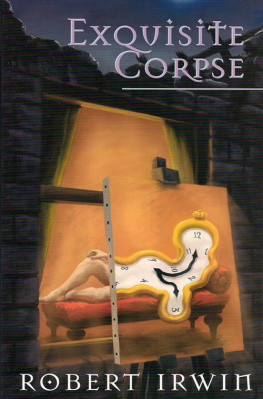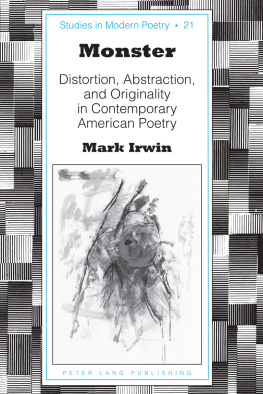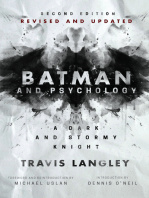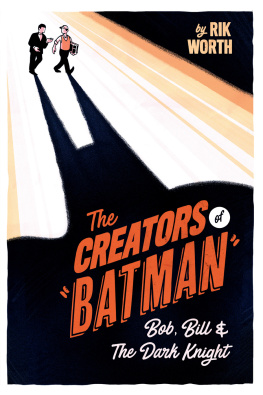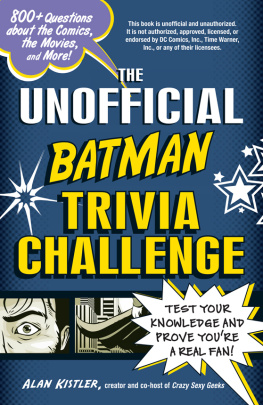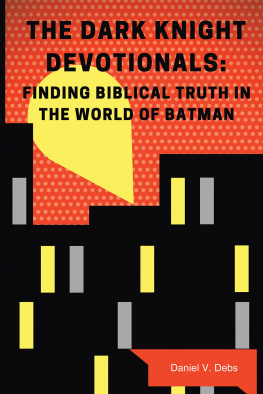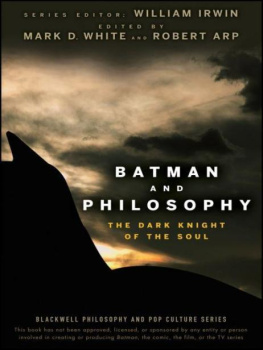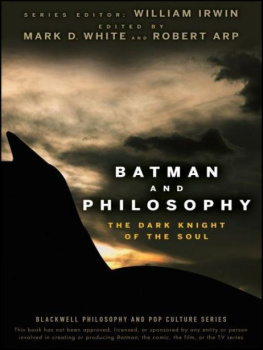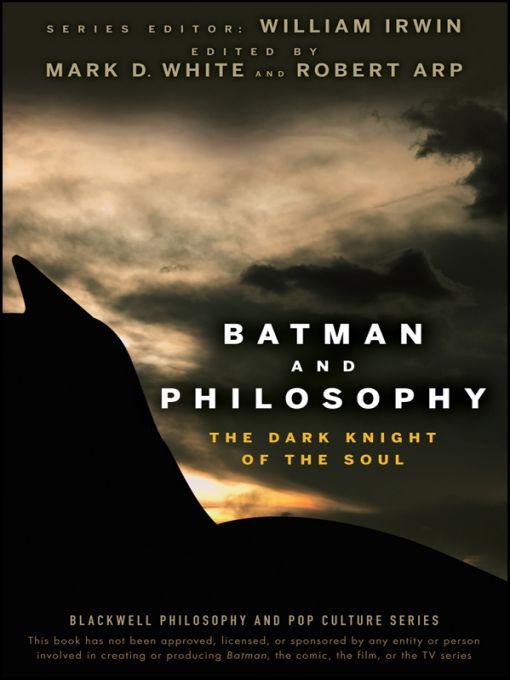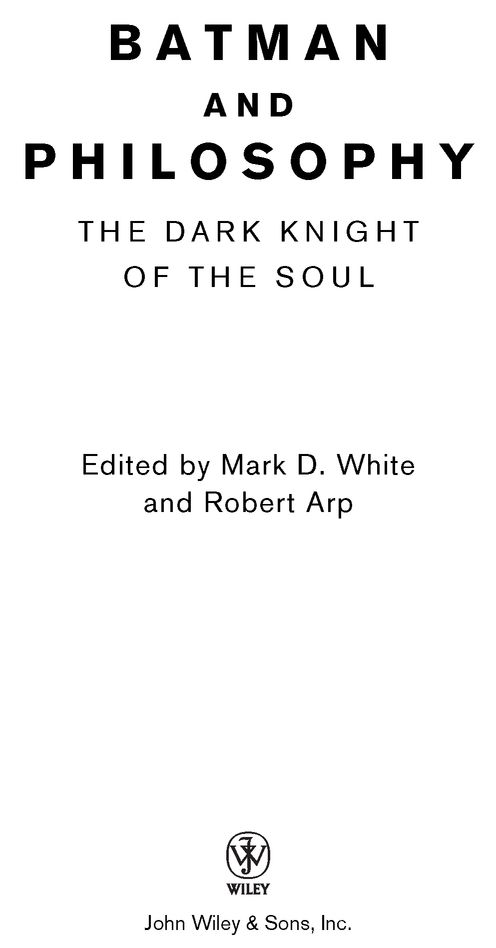Table of Contents
The Blackwell Philosophy and Pop Culture Series
Series Editor: William Irwin
South Park and Philosophy
Edited by Robert Arp
Metallica and Philosophy
Edited by William Irwin
Family Guy and Philosophy
Edited by J. Jeremy Wisnewski
The Daily Show and Philosophy
Edited by Jason Holt
Lost and Philosophy
Edited by Sharon Kaye
24 and Philosophy
Edited by Richard Davis, Jennifer Hart Week,
and Ronald Weed
Battlestar Galactica and Philosophy
Edited by Jason T. Eberl
The Office and Philosophy
Edited by J. Jeremy Wisnewski
House and Philosophy
Edited by Henry Jacoby
Heroes and Philosophy
Edited by David Kyle Johnson
To the memory of Heath Ledger (1979-2008)
ACKNOWLEDGMENTS
The Oscar Speech George Clooney Never Got to Make
We wish to thank the Justice League (Eric Nelson, Connie Santisteban, and the rest of the staff at Wiley) for their stewardship and valuable input; Commissioner Gordon and the Gotham City Police Department (Jeff Dean and Blackwell), under whom this project was started; and Thomas Wayne (Bill Irwin) for his interminable assistance and inspiration. (Never fear, Bills still alivewho would oversee Batwoman and Philosophy if he werent?)
Mark wishes to thank the legions of writers, artists, and editors who have made Batman come alive for him for decades; and Rob wishes to thank his wife, Susan (even though shes never written a Batman storynot even one!).
INTRODUCTION
RIDDLE ME THIS...
We know what youre thinking (because were smartwere philosophers): Batman and Philosophy? Seriously? Why?
Well, since you asked.... Because we believe that Batman is the most complex character ever to appear in comic books and graphic novels. Because the stories featuring him over the last seventy years, not only in the comics but also on animated and live-action TV shows and in movies, have provided us with a wealth of philosophical material to discuss. And because we had the chance, along with about twenty other fans, to combine our passion for the character with our love for philosophical mumbling, all to create the book you now hold in your hands. (No need to thank uswere happy to do it.)
One reason Batman appeals to so many people around the world is that he is just a human being, even though he is nothing like the rest of us. He has devoted his entire life to avenging the death of his parents and all other victims of crime by risking life and limb to protect his city of Gotham and beyond. He has spent years and sacrificed everything to train his body and his mind to the point of perfection. He is wealthy beyond measure, but denies himself all luxuries (except a butler) in pursuit of a goal that will never be attained. And he does all this dressed like a giant bat. (Well, that we can do, but thats about it!)
What makes a person go to such extremes? Is what Batman does good, or right, or virtuous? And what does his obsession, his devotion to the mission, say about who he is? How does he treat his partners, his friends, and his enemies? What is it like to actually be Batman? These are all genuine philosophical questions, and when we read Batman stories, we cant help but think about this stuff (and then write down our thoughts). The twenty chapters in this book explore issues of ethics, identity, friendship, politics, and more, using examples drawn from famous Batman stories such as The Dark Knight Returns, Batman: Year One, No Mans Land, A Death in the Family, and The Killing Joke, as well as the various movies, animated series, and yes, old chum, even the 1960s TV series with Adam West and Burt Ward.
So whether you know every detail of Jason Todds recent resurrection, or whether you can recite all of Jack Nicholsons lines from Tim Burtons first Batman movie, or if you just have fond recollections of Halloweens past wearing the blue cowl and cape, theres something in this book for you. The Bat-signals shininglets go!
PART ONE
DOES THE DARK KNIGHT ALWAYS DO RIGHT?
WHY DOESNT BATMAN KILL THE JOKER?
Mark D. White
Meet the Joker
In the last several decades, the Joker has transformed himself from the Clown Prince of Crime to a heinous murderer without rival. Most notoriously, he killed the second Robin, Jason Todd, beating him to a bloody pulp before blowing him up. He shot and killed Lieutenant Sarah Essen, Commissioner Jim Gordons second wifein front of dozens of infants, no less, whom he threatened to kill in order to lure Essen to him. Years earlier, the Joker shot Barbara GordonJim Gordons adopted daughter and the former Batgirlin the spine, paralyzing her from the waist down, and then tormented Jim with pictures of her lying prone, naked and bleeding. And let us not forget countless ordinary citizens of Gotham Citythe Joker even wiped out all of his own henchmen recently!
Every time the Joker breaks out of Arkham Asylum, he commits depraved crimesthe type that philosopher Joel Feinberg (1926-2004) calls sick! sick! sick!, or triple-sick. Batman knows that the Joker will escape, and that he will likely kill again unless the Caped Crusader can prevent itwhich, obviously, he cant always do.
So why doesnt Batman just kill the Joker? Think of all the lives it would save! Better yet, think of all the lives it would have saved had he done the deed years ago, just among Batmans closest friends and partners. Commissioner Gordon has contemplated killing the Joker himself on several occasions, and Batman is usually the one to stop him.
So though he may have considered it on many occasions, Batman has never killed the Joker, decidedly his most homicidal enemy. Of course, with the exception of his very earliest cases, Batman has refused to kill at all, usually saying that if he kills, it would make him as bad as the criminals he is sworn to fight. But that seems almost selfishsomeone could very well say, Heyits not about you, Bats! Or... is it? Should it be? Usually we think a person is obligated to do something that would benefit many people, but what if that something is committing murder? Which is more important, doing goodor not doing wrong? (UghAlfred, we need some aspirin here.)
In this chapter, well consider the ethics of killing to prevent future killings, exactly the problem Batman faces when he balances his personal moral code against the countless lives that he could save. In fact, this issue has been raised many times, very recently by both the villain Hush and Jason Todd himself (returned from the dead), and earlier by Jean-Paul Valley (the Knightfall Batman), none of whom have the strict moral code that Batman adheres to. Ill do this by introducing some famous philosophical thought experiments that let us trace through the ethics of a situation by whittling it down to its most basic elements, just like Batman solving a cleverly plotted crime. (Well, not quite, but you have to let a guy dream!)
Is Batman a Utilitarian or Deontologist? (Or None of the Above?)
The argument in favor of killing the Joker is fairly straightforwardif Batman kills the Joker, he would prevent all the murders the Joker would otherwise commit in the future. This rationale is typical of


